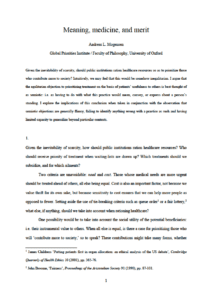Meaning, medicine, and merit
Andreas Mogensen (Global Priorities Institute, Oxford University)
GPI Working Paper No. 3-2019, published in Utilitas
Given the inevitability of scarcity, should public institutions ration healthcare resources so as to prioritize those who contribute more to society? Intuitively, we may feel that this would be somehow inegalitarian. I argue that the egalitarian objection to prioritizing treatment on the basis of patients’ usefulness to others is best thought of as semiotic: i.e. as having to do with what this practice would mean, convey, or express about a person’s standing. I explore the implications of this conclusion when taken in conjunction with the observation that semiotic objections are generally flimsy, failing to identify anything wrong with a practice as such and having limited capacity to generalize beyond particular contexts.
Other working papers
Against Anti-Fanaticism – Christian Tarsney (Population Wellbeing Initiative, University of Texas at Austin)
Should you be willing to forego any sure good for a tiny probability of a vastly greater good? Fanatics say you should, anti-fanatics say you should not. Anti-fanaticism has great intuitive appeal. But, I argue, these intuitions are untenable, because satisfying them in their full generality is incompatible with three very plausible principles: acyclicity, a minimal dominance principle, and the principle that any outcome can be made better or worse. This argument against anti-fanaticism can be…
Existential risk and growth – Leopold Aschenbrenner (Columbia University)
Human activity can create or mitigate risks of catastrophes, such as nuclear war, climate change, pandemics, or artificial intelligence run amok. These could even imperil the survival of human civilization. What is the relationship between economic growth and such existential risks? In a model of directed technical change, with moderate parameters, existential risk follows a Kuznets-style inverted U-shape. …
On the desire to make a difference – Hilary Greaves, William MacAskill, Andreas Mogensen and Teruji Thomas (Global Priorities Institute, University of Oxford)
True benevolence is, most fundamentally, a desire that the world be better. It is natural and common, however, to frame thinking about benevolence indirectly, in terms of a desire to make a difference to how good the world is. This would be an innocuous shift if desires to make a difference were extensionally equivalent to desires that the world be better. This paper shows that at least on some common ways of making a “desire to make a difference” precise, this extensional equivalence fails.

